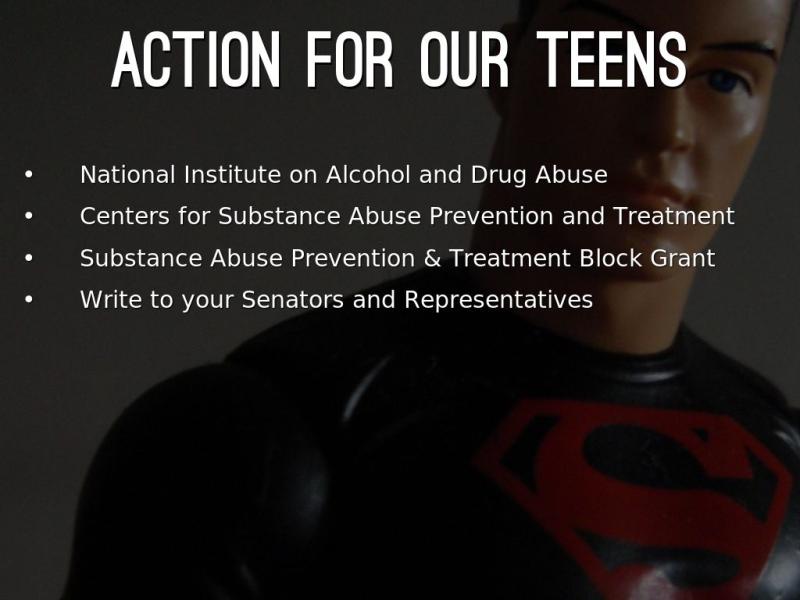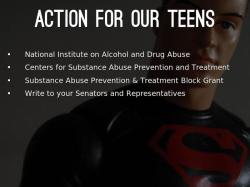Why do teens turn to substance abuse?
Teen substance abuse is a complex issue influenced by a combination of factors. It's important to note that not all teenagers who face these risk factors will engage in substance abuse, and some who do engage in substance abuse may not exhibit all these risk factors. Here are some common factors that can contribute to teen substance abuse:
Peer Pressure: Adolescents often seek approval and acceptance from their peers. Peer pressure can lead them to try substances to fit in or feel part of a social group.
Curiosity: Teens are naturally curious, and they may experiment with substances to satisfy that curiosity. This can be especially true if they hear about or see others using drugs or alcohol.
Stress and Coping Mechanisms: The teenage years can be challenging, and adolescents may turn to drugs or alcohol as a way to cope with stress, anxiety, or other emotional struggles.
Family Environment: A family environment where substance abuse is prevalent can increase the risk for teenagers to follow a similar path. Family dynamics, lack of parental involvement, or a history of substance abuse in the family can be contributing factors.
Mental Health Issues: Teens with underlying mental health problems, such as depression, anxiety, or attention-deficit/hyperactivity disorder (ADHD), may use substances as a way to self-medicate and alleviate their symptoms.
Availability of Substances: Easy access to drugs or alcohol at home or in the community can make it more likely for teens to experiment and engage in substance abuse.
Media and Popular Culture: The portrayal of substance use in media, including movies, music, and social media, can glamorize or normalize it, influencing some teenagers to try substances.
Low Self-Esteem: Adolescents with low self-esteem or feelings of inadequacy may turn to substances to boost their confidence or self-image.
Lack of Education and Awareness: Some teenagers may not fully understand the risks and consequences associated with substance abuse, and therefore, they may underestimate the potential harm.
Genetic Factors: Genetics can play a role in a person's susceptibility to addiction. If there is a family history of substance abuse, a teen may be at a higher risk.
Trauma and Adverse Childhood Experiences: Teens who have experienced trauma or adverse childhood experiences, such as abuse or neglect, may be more prone to substance abuse as a way to cope with their emotional pain.
Socioeconomic Factors: Economic disparities, neighborhood environments, and lack of access to positive opportunities can increase the risk of substance abuse in some teens.
Preventing and addressing teen substance abuse requires a multifaceted approach. Parents, educators, and healthcare professionals can play a critical role in educating teenagers about the risks of substance abuse, promoting healthy coping mechanisms, and providing support for mental health issues. Open communication, a supportive environment, and early intervention can help reduce the likelihood of teens turning to substance abuse. If you suspect that a teenager is struggling with substance abuse, it's essential to seek professional help and guidance to address the issue effectively.
Exploring the Reasons Why Teens Turn to Substance Abuse
Teenagers face various challenges and pressures during their formative years, making them more susceptible to substance abuse. Understanding the underlying reasons can help address the issue effectively.
Here are some common reasons why teens turn to substance abuse:Curiosity and Experimentation: During adolescence, curiosity and experimentation are natural behaviors. Teens may try substances out of curiosity, peer pressure, or a desire to fit in.
Emotional and Social Issues: Teens often grapple with emotional and social challenges, such as stress, anxiety, depression, loneliness, or bullying. They may resort to substance abuse to cope with these negative emotions or self-medicate.
Family Influences: Family dynamics can play a significant role in teen substance abuse. A history of substance abuse in the family, parental neglect or abuse, or a lack of open communication can increase the risk.
Mental Health Conditions: Underlying mental health conditions, such as attention deficit hyperactivity disorder (ADHD), bipolar disorder, or anxiety disorders, can also contribute to substance abuse.
Environmental Factors: Exposure to substance abuse in the community, easy access to drugs or alcohol, and a lack of positive role models can increase the likelihood of teen substance abuse.
Factors Contributing to Adolescent Substance Abuse
Several factors can contribute to the development of substance abuse problems in adolescents:
Genetics: Genetic predisposition can increase the risk of developing an addiction.
Age of First Use: Early initiation of substance use increases the likelihood of developing a substance use disorder.
Brain Development: The adolescent brain is still developing, making it more vulnerable to the effects of substances and addiction.
Personality Traits: Certain personality traits, such as impulsivity, sensation-seeking, and low self-esteem, may make teens more susceptible to substance abuse.
Social Environment: Peer pressure, exposure to risky behaviors, and a lack of supportive relationships can increase the risk of substance abuse.
Preventing and Educating Teens about Substance Abuse
Preventing teen substance abuse requires a multifaceted approach that involves education, early intervention, and supportive environments:
Comprehensive Education: Provide comprehensive substance abuse education programs in schools, starting at an early age. Teach teens about the risks of substance abuse, the effects on their health and well-being, and strategies for making healthy choices.
Early Intervention: Implement early intervention programs to identify and support teens at risk of substance abuse. These programs can provide counseling, mentorship, and skill-building opportunities.
Parental Involvement: Encourage open communication between parents and teens about substance abuse. Parents should be aware of their teens' activities and provide support and guidance.
Positive Environments: Create positive and supportive environments at home, school, and in the community. Foster a sense of belonging, encourage healthy activities, and provide opportunities for teens to develop their talents and interests.
Supporting Teens in Overcoming Substance Abuse
If a teen is struggling with substance abuse, it's crucial to provide support and encourage them to seek professional help. Here's how you can support a teen in overcoming substance abuse:
Express Concern and Support: Talk to the teen openly and honestly about your concerns. Let them know you care about them and want to help.
Encourage Professional Help: Encourage the teen to seek professional help from a therapist, counselor, or addiction specialist. Professional treatment can provide the necessary support and guidance for recovery.
Be Patient and Understanding: Recovery is a process that takes time and effort. Be patient with the teen and offer support and encouragement throughout their journey.
Create a Supportive Environment: Create a supportive environment at home and in the community. Avoid criticizing or blaming the teen, and focus on positive reinforcement and encouragement.
Seek Family Support: Consider family therapy or support groups to help family members understand substance abuse and learn how to best support the teen in recovery.
Community and School-Based Initiatives to Curb Teen Substance Abuse
Community and school-based initiatives can play a significant role in preventing and addressing teen substance abuse:
After-School Programs: Provide engaging and supervised after-school programs that offer positive activities, mentorship, and skill-building opportunities.
Community Education Programs: Organize community education programs to raise awareness about substance abuse among parents, teachers, and community members.
Peer-to-Peer Programs: Implement peer-to-peer programs where trained teens mentor and support their peers in making healthy choices and avoiding substance abuse.
Mental Health Awareness: Promote mental health awareness and provide accessible mental health services for teens to address underlying issues that may contribute to substance abuse.
Policy and Advocacy: Advocate for policies that restrict access to substances for minors, promote prevention programs, and support treatment and recovery services.


